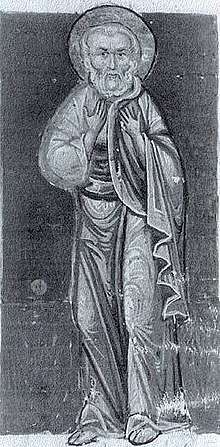
In the whole range of evil thoughts, none is richer in resources than self-esteem.
Evagrius Ponticus (345–399 AD) was a Christian monk and ascetic.
Quotes
The Philokalia
- as translated and edited by G. E. H. Palmer, Philip Sherrard and Kallistos Ware (1979)
- Do not desire wealth for giving to the poor.
- Outline Teaching on Asceticism and Stillness in the Solitary Life, vol. 1, p. 32
- Just as it is possible to think of water both while thirsty and while not thirsty, so it is possible to think of gold with greed and without greed. The same applies to other things.
- On Discrimination, vol. 1, p. 40
- In the whole range of evil thoughts, none is richer in resources than self-esteem.
- On Discrimination, vol. 1, p. 46
- The demon of avarice, it seems to me, is extraordinarily complex and is baffling in his deceits. Often, when frustrated by the strictness of our renunciation, he immediately pretends to be a steward and a lover of the poor; he urges us to prepare a welcome for strangers who have not yet arrived or to send provisions for absent brethren. He makes us mentally visit prisons in the city and ransom those on sale as slaves. He suggests that we should attach ourselves to wealthy women, and advises us to be obsequious to others who have a full purse. And so, after deceiving the soul, little by little he engulfs it in avaricious thoughts and then hands it over to the demon of self-esteem.
- On Discrimination, vol. 1, p. 51
The Praktikos
- Bamberger, John Eudes, trans. 1972. Evagrius Ponticus: The Praktikos. Chapters on Prayer. Kalamazoo, Michigan: Cistercian Publications.
- 52. To separate the body from the soul is the privilege of only of the One who has joined them together. But to separate the soul from the body lies as well in the power of the man who pursues virtue. For our Fathers gave to the meditation of death and to the flight from the body a spiritual name: anachoresis [withdrawal].
- 64. The proof of apatheia is had when the spirit begins to see its own light, when it remains in a state of tranquility in the presence of the images it has during sleep and when it maintains its calm as it beholds the affairs of life.
- 81. Agape is the progeny of apatheia. Apatheia is the very flower of ascesis. Ascesis consists in keeping the commandments. The custodian of those commandments is the fear of God which is in turn the offspring of true faith. Now faith is an interior an interior good, one which is to be found even in those who do not yet believe in God.
- (Order: (1) interior good > (2) true faith > (3) fear of God > (4) keeping the commandments > (5) ascesis > (6) apatheia > (7) agape)
- 97. One of the brethren owned only a book of the Gospels. He sold this and gave the money for the support of the poor. He made a statement that deserves remembrance: "I have sold the very word that speaks to me saying: 'Sell your possessions and give to the poor.'"
Chapters on Prayer
- Bamberger, John Eudes, trans. 1972. Evagrius Ponticus: The Praktikos. Chapters on Prayer. Kalamazoo, Michigan: Cistercian Publications.
- 35. Prayer is an ascent of the spirit to God.
- 36. Do you wish to pray? Renounce all things. You then will become heir to all.
- 37. First of all pray to be purified from your passions. Secondly, pray to be delivered from ignorance. Thirdly, pray to be freed from all temptation and abandonment.
- 70. You will not be able to pray purely if you are all involved with material affairs and agitated with unremitting concerns. For prayer is the rejection of conceptions.
- 117. Let me repeat this saying of mine that I once expressed on some other occasions: Happy is the spirit that attains to the perfect formlessness at the time of prayer.
- 118. Happy is the spirit which, praying with distraction, goes on increasing its desire for God.
- 119. Happy is the spirit that becomes free of all matter and is stripped of all at the time of prayer.
- 120. Happy is the spirit that attains to complete unconsciousness of all sensible experience at the time of prayer.
- 121. Happy is the man who thinks himself no better than dirt.
- 122. Happy is the monk who views the welfare and progress of all men with as much joy as if it were his own.
- 123. Happy is the monk who considers all men as god — after God.
- 124. A monk is a man who is separated from all and who is in harmony with all.
- 125. A monk is a man who considers himself one with all men because he seems constantly to see himself in every man.
- 150. Just as sight is the most worthy of the sense, so also is prayer the most divine of the virtues.
- 153. When you give yourself to prayer, rise above every other joy — then you will find true prayer.
External links
- The Praktikos online, with Greek text (Translation by Luke Dysinger, O.S.B.)
This article is issued from
Wikiquote.
The text is licensed under Creative
Commons - Attribution - Sharealike.
Additional terms may apply for the media files.